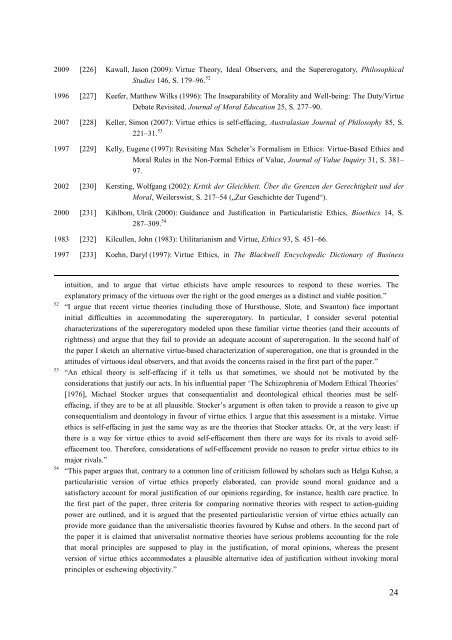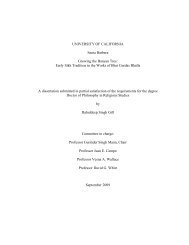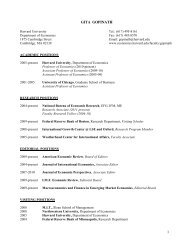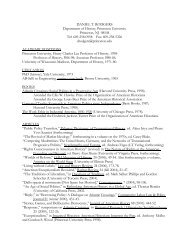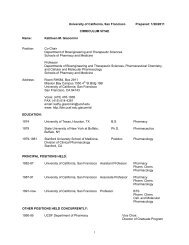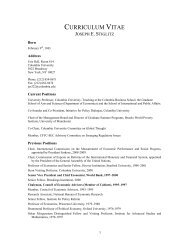2009 [226] Kawall, Jas<strong>on</strong> (2009): <strong>Virtue</strong> Theory, Ideal Observers, and the Supererogatory, PhilosophicalStudies 146, S. 179–96. 521996 [227] Keefer, Matthew Wilks (1996): The Inseparability of Morality and Well-being: The Duty/<strong>Virtue</strong>Debate Revisited, Journal of Moral Educati<strong>on</strong> 25, S. 277–90.2007 [228] Keller, Sim<strong>on</strong> (2007): <strong>Virtue</strong> ethics is self-effacing, Australasian Journal of Philosophy 85, S.221–31. 531997 [229] Kelly, Eugene (1997): Revisiting Max Scheler’s Formalism in Ethics: <strong>Virtue</strong>-Based Ethics andMoral Rules in the N<strong>on</strong>-Formal Ethics of Value, Journal of Value Inquiry 31, S. 381–97.2002 [230] Kersting, Wolfgang (2002): Kritik der Gleichheit. Über die Grenzen der Gerechtigkeit und derMoral, Weilerswist, S. 217–54 („Zur Geschichte der Tugend“).2000 [231] Kihlbom, Ulrik (2000): Guidance and Justificati<strong>on</strong> in Particularistic Ethics, Bioethics 14, S.287–309. 541983 [232] Kilcullen, John (1983): Utilitarianism and <strong>Virtue</strong>, Ethics 93, S. 451–66.1997 [233] Koehn, Daryl (1997): <strong>Virtue</strong> Ethics, in The Blackwell Encyclopedic Dicti<strong>on</strong>ary of Business525354intuiti<strong>on</strong>, and to argue that virtue ethicists have ample resources to resp<strong>on</strong>d to these worries. Theexplanatory primacy of the virtuous over the right or the good emerges as a distinct and viable positi<strong>on</strong>.”“I argue that recent virtue theories (including those of Hursthouse, Slote, and Swant<strong>on</strong>) face importantinitial difficulties in accommodating the supererogatory. In particular, I c<strong>on</strong>sider several potentialcharacterizati<strong>on</strong>s of the supererogatory modeled up<strong>on</strong> these familiar virtue theories (and their accounts ofrightness) and argue that they fail to provide an adequate account of supererogati<strong>on</strong>. In the sec<strong>on</strong>d half ofthe paper I sketch an alternative virtue-based characterizati<strong>on</strong> of supererogati<strong>on</strong>, <strong>on</strong>e that is grounded in theattitudes of virtuous ideal observers, and that avoids the c<strong>on</strong>cerns raised in the first part of the paper.”“An ethical theory is self-effacing if it tells us that sometimes, we should not be motivated by thec<strong>on</strong>siderati<strong>on</strong>s that justify our acts. In his influential paper ‘The Schizophrenia of Modern Ethical Theories’[1976], Michael Stocker argues that c<strong>on</strong>sequentialist and de<strong>on</strong>tological ethical theories must be selfeffacing,if they are to be at all plausible. Stocker’s argument is often taken to provide a reas<strong>on</strong> to give upc<strong>on</strong>sequentialism and de<strong>on</strong>tology in favour of virtue ethics. I argue that this assessment is a mistake. <strong>Virtue</strong>ethics is self-effacing in just the same way as are the theories that Stocker attacks. Or, at the very least: ifthere is a way for virtue ethics to avoid self-effacement then there are ways for its rivals to avoid selfeffacementtoo. Therefore, c<strong>on</strong>siderati<strong>on</strong>s of self-effacement provide no reas<strong>on</strong> to prefer virtue ethics to itsmajor rivals.”“This paper argues that, c<strong>on</strong>trary to a comm<strong>on</strong> line of criticism followed by scholars such as Helga Kuhse, aparticularistic versi<strong>on</strong> of virtue ethics properly elaborated, can provide sound moral guidance and asatisfactory account for moral justificati<strong>on</strong> of our opini<strong>on</strong>s regarding, for instance, health care practice. Inthe first part of the paper, three criteria for comparing normative theories with respect to acti<strong>on</strong>-guidingpower are outlined, and it is argued that the presented particularistic versi<strong>on</strong> of virtue ethics actually canprovide more guidance than the universalistic theories favoured by Kuhse and others. In the sec<strong>on</strong>d part ofthe paper it is claimed that universalist normative theories have serious problems accounting for the rolethat moral principles are supposed to play in the justificati<strong>on</strong>, of moral opini<strong>on</strong>s, whereas the presentversi<strong>on</strong> of virtue ethics accommodates a plausible alternative idea of justificati<strong>on</strong> without invoking moralprinciples or eschewing objectivity.”24
Ethics, hrsg. v<strong>on</strong> Patricia H. Werhane und R. Edward Freeman, Oxford, S. 647–50.2008 [234] Koggel, Christine (2008): Burdening the Burdened <strong>Virtue</strong>s, Hypatia 23, S. 197–204. – Zu [440].2008 [235] Kristjánss<strong>on</strong>, Kristján (2008): An Aristotelian Critique of Situati<strong>on</strong>ism, Philosophy 83, S. 55–76. 551987 [236] Kruschwitz, R./Roberts R. (Hrsg.) (1987): The <strong>Virtue</strong>s. C<strong>on</strong>temporary Essays <strong>on</strong> MoralCharacter, Belm<strong>on</strong>t, Cal.1998 [237] Kultgen, John (1998): The Vicissitudes of Comm<strong>on</strong>-Sense <strong>Virtue</strong> Ethics, Part I: From Aristotleto Slote, Journal of Value Inquiry 32, S. 325–41.1998 [238] Kultgen, John (1998): The Vicissitudes of Comm<strong>on</strong>-Sense <strong>Virtue</strong> Ethics, Part II: The HeuristicUse of Comm<strong>on</strong> Sense, Journal of Value Inquiry 32, S. 465–78.1999 [239] Kupfer, Joseph (1999): Visi<strong>on</strong>s of <strong>Virtue</strong> in Popular Film, Boulder. 562007 [240] Kupfer, Joseph H. (2007): Prostitutes, Musicians, and Self-Respect: <strong>Virtue</strong>s and Vices ofPers<strong>on</strong>al Life, Lanham. 571988 [241] Kupperman, Joel J. (1988): Character and Ethical Theory, in Midwest Studies in PhilosophyVol. XIII: Ethical Theory: Character and <strong>Virtue</strong>, hrsg. v<strong>on</strong> Peter A. French, TheodoreE. Uehling, Jr. und Howard K. Wettstein, Notre Dame, S. 115–25.1991 [242] Kupperman, Joel J. (1991): Character, New York, S. 90–114 (“Justice and the <strong>Virtue</strong>s”).2001 [243] Kupperman, Joel J. (2001): The Indispensability of Character, Philosophy 76, S. 239–50. – Zu[171].2006 [244] Kupperman, Joel J. (2006): Six Myths About the Good Life: Thinking About What Has Value,Indianapolis, S. 82–109 (“Myth Five – There Is No Real C<strong>on</strong>necti<strong>on</strong>, At Least in ThisLife, Between True <strong>Virtue</strong> and a Desirable Kind of Life”), S. 110–27 (“Myth Six – True555657“Aristotle says that no human achievement has the stability of activities that express virtue. Ethicalsituati<strong>on</strong>ists c<strong>on</strong>sider this claim to be refutable by empirical evidence. If that is true, not <strong>on</strong>lyAristotelianism, but folk psychology, c<strong>on</strong>temporary virtue ethics and character educati<strong>on</strong> have all beenseriously infirmed. The aim of this paper is threefold: (1) to offer a systematic classificati<strong>on</strong> of the existingobjecti<strong>on</strong>s against situati<strong>on</strong>ism under four main headings: ‘the methodological objecti<strong>on</strong>’, ‘the moraldilemma objecti<strong>on</strong>’, ‘the bullet-biting objecti<strong>on</strong>’ and ‘the anti-behaviouristic objecti<strong>on</strong>’; (2) to resuscitate amore powerful Aristotelian versi<strong>on</strong> of the ‘anti-behaviouristic objecti<strong>on</strong>’ than advanced by previous critics;and (3) to explore some of the implicati<strong>on</strong>s of such resuscitati<strong>on</strong> for our understanding of the salience ofcharacter and for future studies of its nature.”“Synopsis: Out of the interplay between film criticism and a philosophical view of virtue, Joseph Kupferargues that film ficti<strong>on</strong>s can be integral to moral reflecti<strong>on</strong>, and thus by examining the narrative andcinematic aspects of popular films, we can derive important moral truths about people and their behaviour.Taking as his base a classical c<strong>on</strong>cepti<strong>on</strong> of virtue and vice, Kupfer offers an in-depth examinati<strong>on</strong> of“Groundhog Day”, “The African Queen”, “Parenthood”, “Rob Roy”, “Fresh”, “Jaws” and “Aliens” in orderto investigate the value of virtue within ever-widening social c<strong>on</strong>texts.” (Amaz<strong>on</strong>.co.uk)“Introducti<strong>on</strong>. Chapter 1. The Moral Perspective of Humility. Chapter 2. Sentimentalizing Emoti<strong>on</strong>.Chapter 3. Generosity of Spirit. Chapter 4. Overcoming Envy. Chapter 5. When Waiting is Weightless: The<strong>Virtue</strong> of Patience. Chapter 6. No Regrets, No Debts: The <strong>Virtue</strong> of Gratitude. Chapter 7. Romantic Loveand Moral Growth. Chapter 8. Prostitutes, Musicians, and Self-Respect. C<strong>on</strong>clusi<strong>on</strong>.”25
- Page 1: Literatur
- Page 4 and 5: national Journal of Management Revi
- Page 6: 53.2010 [39] Battaly, Heather (2010
- Page 9 and 10: 2005 [60] Brady, Michael S. (2005):
- Page 11 and 12: 2008 [72] Calhoun, Cheshire (2008):
- Page 13 and 14: 1998 [93] Cooper, John M. (1998): T
- Page 15 and 16: 2005 [120] Doris, John M. (2005): R
- Page 17 and 18: 1978 [138] Foot, Philippa (1978): V
- Page 19 and 20: 1996 [166] Griffin, James (1996): V
- Page 21 and 22: 166-84.1996 [188] Hooker, Brad (199
- Page 23: Theory and Moral Practice 8, S. 387
- Page 27 and 28: Deutsche Zeitschrift für Philosoph
- Page 29 and 30: 2009 [280] Miller, Christian (2009)
- Page 31 and 32: 2000 [299] Oderberg, David S. (2000
- Page 33 and 34: Moral Education 24, S. 175-184.1997
- Page 35 and 36: Southern Journal of Philosophy 14,
- Page 37 and 38: 1997 [379] Slote, Michael (1997): V
- Page 39 and 40: 2009 [401] Sreenivasan, Gopal (2009
- Page 41 and 42: 2010 [416] Stohr, Karen E. (2010):
- Page 43 and 44: 2008 [441] Tessman, Lisa (2008): Re
- Page 45 and 46: 2009 [457] van Zyl, Liezl (2009): A
- Page 47 and 48: 2006 [475] Webber, Jonathan (2006):
- Page 49 and 50: 2008 [484] White, Richard (2008): R


